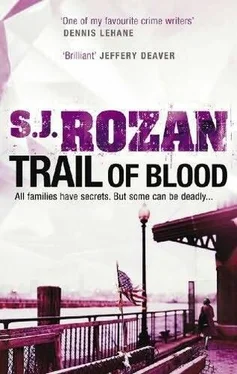S Rozan - Trail of Blood
Здесь есть возможность читать онлайн «S Rozan - Trail of Blood» весь текст электронной книги совершенно бесплатно (целиком полную версию без сокращений). В некоторых случаях можно слушать аудио, скачать через торрент в формате fb2 и присутствует краткое содержание. Жанр: Триллер, на английском языке. Описание произведения, (предисловие) а так же отзывы посетителей доступны на портале библиотеки ЛибКат.
- Название:Trail of Blood
- Автор:
- Жанр:
- Год:неизвестен
- ISBN:нет данных
- Рейтинг книги:5 / 5. Голосов: 1
-
Избранное:Добавить в избранное
- Отзывы:
-
Ваша оценка:
- 100
- 1
- 2
- 3
- 4
- 5
Trail of Blood: краткое содержание, описание и аннотация
Предлагаем к чтению аннотацию, описание, краткое содержание или предисловие (зависит от того, что написал сам автор книги «Trail of Blood»). Если вы не нашли необходимую информацию о книге — напишите в комментариях, мы постараемся отыскать её.
Trail of Blood — читать онлайн бесплатно полную книгу (весь текст) целиком
Ниже представлен текст книги, разбитый по страницам. Система сохранения места последней прочитанной страницы, позволяет с удобством читать онлайн бесплатно книгу «Trail of Blood», без необходимости каждый раз заново искать на чём Вы остановились. Поставьте закладку, и сможете в любой момент перейти на страницу, на которой закончили чтение.
Интервал:
Закладка:
“I was reading law,” was his answer. “Though from what I hear, law is a discipline very much needed in Shanghai at the moment, and very little in demand.” He fell silent, staring over the water.
“I’m sorry,” I ventured. “I seem to be touching today only on subjects that distress you.”
At this he stirred himself. “No, no, I’m the one who must apologize. I was… brooding.” And he smiled.
“Over what, if I may ask?”
“Ah, Rosalie. You’ve left a country where your people have lived for centuries, but are no longer welcome. I fear I return to one.”
“How can that be? You’re a Chinaman going to China.”
His smile broadened. “First, you must not say ‘Chinaman.’ ” (Mama, this word has no German equivalent, but is in common use in English. I never knew it was offensive before this.) “It’s a word used by Europeans and carries a condescending odor. You’ll find more friends in Shanghai if you say ‘Chinese.’ I know this seems trivial-”
I assured him it did not, having been myself rudely awakened in the past months to the pain words can cause. “I can’t pretend to understand the nuance, because my English is so poor,” I told him. “But if the word offends you, I shall strike it from my vocabulary!”
“I and my countrymen thank you. And permit me to say, if you’re able to slip ‘nuance’ so neatly into a sentence, you must stop thinking your English poor.”
I thanked him for the compliment (though, Mama, his English really does outshine mine) and asked what he meant by being unwelcome in China, whether he referred to the Japanese occupation.
“The occupation, yes; though I can understand foreign invaders better than I can the puppet government-Chinese so hungry for power and wealth that they take orders from invaders, against their own people.”
“But what of the government this puppet one replaces? Is there no resistance movement of loyal Chinese, working to retake the country?” I was of course thinking, Mama, of the situation at home, of those loyalists who refuse to accept Herr Hitler’s Anschluss.
“What they replaced,” Kai-rong replied, “was hardly a government. Chiang Kai-shek and his Nationalists are two-faced thieves who betrayed the Republic many years ago, before it could take root. And half the country, in any case, was never under their control-and isn’t under Japanese control now. It’s strangled by warlords. Greedy thugs to whom ‘ China ’ is an abstract concept, while wealth is a concept they understand.” He paused, sipping coffee; I had no idea how to respond. And then, Mama, he made this extraordinary statement: “As painful as your situation is, Rosalie, there may be an advantage in having no country to fight over. Your traditions are long and beautiful, and your spiritual nature has flowered in the absence of the distractions of politics and the necessity, once power is gained, to keep a grip on it.”
I was amazed by this, and had to answer: “Also in the absence of safety, and often of food to fill our bellies!”
Surprised, he said, “Did I sound patronizing? I apologize.”
My indignation vanished and I began to laugh, pointing out we were apologizing to each other with every third breath!
“You’re right,” he said, “and if that’s my fault, I apologize.” He laughed with me.
Then he grew pensive and added, “But it seems we have something to envy in each other’s history, if not in each other’s circumstances. Come now, there’s still linzer torte to fill your belly. And I can return, if you want, to the Northern Song, and pick up where we left off.”
I sighed. “Yes, please, though I don’t think it will do much good. But first, you never gave an answer to my question: Is there in China a resistance movement against the Japanese?”
I thought he wouldn’t reply, but at last he said, “Yes. There is. Fighting to regain China for the Chinese people.”
“Will they win?”
“If you’re asking me to tell the future, I can’t do it. But I can tell you this: History is on the side of China. Now pick up your plate and let’s return to history.”
And we did. Not that, as I say, I’ve managed to learn much about the past. But I’ve learned enough about Chen Kai-rong to look forward to the future-tomorrow’s lesson, accompanied by fragrant tea and curious Chinese cakes.
Stay well, Mama!
Your Rosalie
3 May 1938
Dearest Mama,
I haven’t written for some time, I know, but as I’ve been told there will now be no mail service until we reach Singapore, I feel foolish putting pen to paper to produce a letter that will sit on my bureau for days. Paul applauds this lack of enterprise on my part, seeming to feel it justifies his own, though I have a number of previous letters to point to, which makes me feel quite superior but has little effect on him.
But this morning I awoke feeling melancholy, Mama, and missing you greatly. Perhaps the fog which enshrouds us affects my mood. People speak softly; even the children are subdued. We’re less than a week from Shanghai. I believe the enormity of this undertaking has at last forced itself on our understanding. I have had glimpses of it over the past weeks, but have resolutely refused to acknowledge it, preferring the luxury of the ship, the exhilaration of new acquaintances, and the adventure of sailing into the unknown. But the fog brings about an odd sensation. There is little wind, and in no direction can anything be seen beyond the rail. At home a chill fog precedes a change of weather, but this warm, featureless mist seems as though it might continue forever. Ah, and there you have it, Mama: I’ve said “home,” and the word fills me with sadness.
When I look toward the future, excitement and curiousity lighten my trepidation. My new friend, Chen Kai-rong, has taught me much about his country. It’s clear he loves his homeland deeply and longed for it when he was away, equally clear he knows China ’s shortcomings and is eager to see them corrected. His devotion in spite of all he thinks wrong is reassuring, and I hope his feelings will color my own. In this way, I find myself already connected to Shanghai; but when I turn toward the past, my feelings are exactly opposite. I’m no longer connected, but uncoupled and adrift. My every happy memory is shaded by a forlorn longing for the home we’ve lost.
Mama, have you written to us? I understand the fast liners are few and I do not expect a letter from you on each tender that meets us; and yet, as Paul asks, if that’s true, why do I continually put myself in the path of the steward who distributes the passengers’ mail? I should dearly love a letter, Mama. But much much more, I should love to find you and Uncle Horst on the ship that follows immediately behind this one.
I’ll seal this letter now, and lay it on my bureau until tomorrow, when the tender sails out from Singapore. Perhaps by morning the fog will burn off, and I’ll be
Your strong and sunny Rosalie, again.
9 May 1938
Dearest Mama,
Yesterday we arrived in Shanghai.
What a place this is!
How to tell you? How to begin? It’s all so strange, Mama, and we’re so unprepared! On shipboard Chen Kai-rong painted such vivid word-pictures that I felt quite ready to step into life as a practiced “Shanghailander.” But oh, how wrong I was!
Though I’m finding great difficulty, Mama, in putting words to this experience, nevertheless I’ll try, so things won’t be as strange for you when you arrive; and also so you’ll have an idea what Paul and I, in this dizzying world, are feeling.
The night before last, in a thick mist, we bore down on the mouth of the harbor. Everyone ran to the rails, though for some time nothing could be seen. The air became electric when ships loomed from the fog: two liners at anchor, gunships of many nations, and our first sight of the square-sailed junks and flat sampans of the Orient.
Читать дальшеИнтервал:
Закладка:
Похожие книги на «Trail of Blood»
Представляем Вашему вниманию похожие книги на «Trail of Blood» списком для выбора. Мы отобрали схожую по названию и смыслу литературу в надежде предоставить читателям больше вариантов отыскать новые, интересные, ещё непрочитанные произведения.
Обсуждение, отзывы о книге «Trail of Blood» и просто собственные мнения читателей. Оставьте ваши комментарии, напишите, что Вы думаете о произведении, его смысле или главных героях. Укажите что конкретно понравилось, а что нет, и почему Вы так считаете.












